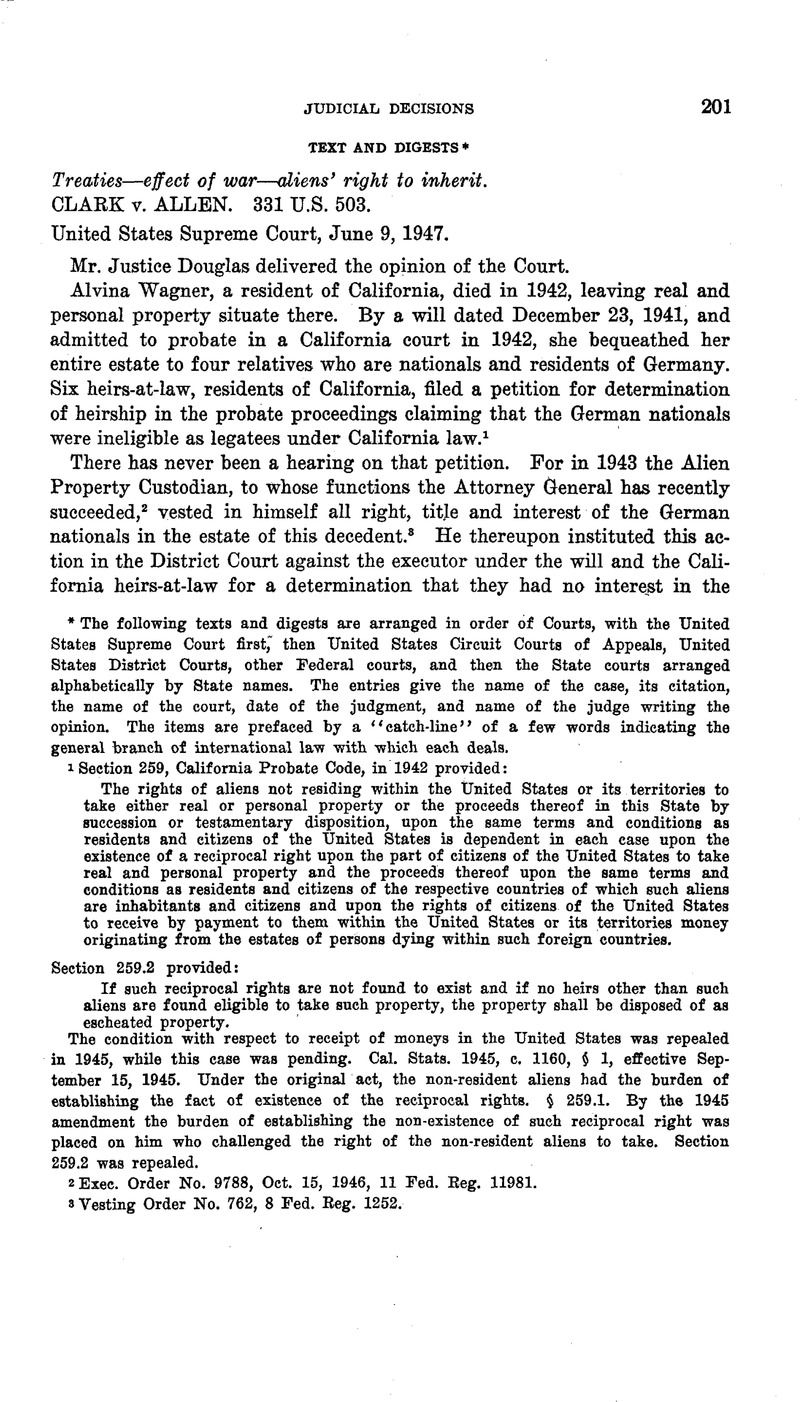No CrossRef data available.

The following texts and digests are arranged in order of Courts, with the United States Supreme Court first, then United States Circuit Courts of Appeals, United States District Courts, other Federal courts, and then the State courts arranged alphabetically by State names. The entries give the name of the case, its citation, the name of the court, date of the judgment, and name of the judge writing the opinion. The items are prefaced by a "catch-line" of a few words indicating the general branch of international law with which each deals.
1 Section 259, California Probate Code, in 1942 provided:
The rights of aliens not residing within the United States or its territories to take either real or personal property or the proceeds there of in this State by succession or testamentary disposition, upon the same terms and conditions as residents and citizens of the United States is dependent in each case upon the existence of a reciprocal right upon the part of citizens of the United States to take real and personal property and the proceeds thereof upon the same terms and conditions as residents and citizens of the respective countries of which such aliens are inhabitants and citizens and upon the rights of citizens of the United States to receive by payment to them within the United States or its territories money originating from the estates of persons dying within such foreign countries.
Section 259.2 provided:
If such reciprocal rights are not found to exist and if no heirs other than such aliens are found eligible to take such property, the property shall be disposed of as escheated property.
The condition with respect to receipt of moneys in the United States was repealed in 1945, while this case was pending. Cal. Stats. 1945, c. 1160, § 1, effective September 15, 1945. Under the original act, the non-resident aliens had the burden of establishing the fact of existence of the reciprocal rights. § 259.1. By the 1945 amendment the burden of establishing the non-existence of such reciprocal right was placed on him who challenged the right of the non-resident aliens to take. Section 259.2 was repealed.
2 Exec. Order No. 9788, Oct. 15, 1946, 11 Fed. Beg. 11981.
3 Vesting Order No. 762, 8 Fed. Beg. 1252.
4 For a recent review of the authorities see Lenoir “The Effect of War on Bilateral Treaties,” 34 Geo. L. J. 129.
5 § 3 (b).
6 § 3 (a).
7 § 7 (c); § 5 (b), as amended; Exec. Order No. 8785, 3 C. F. R. Cum. Supp. 948.
8 § 5 (a).
9 Exec. Order No. 9193, ¶ 5, 3 C. F. R. Cum. Supp. 1174, 1176.
10 Section 5 (b) (1), as amended, provides in part:
During the time of war or during any other period of national emergency declared by the President . . . any property or interest of any foreign country or national thereof shall vest, when, as, and upon the terms, directed by the President, in such agency or person as may be designated from time to time by the President, and upon such terms and conditions as the President may prescribe such interest or property shall be held, used, administered, liquidated, sold, or otherwise dealt with in the interest of and for the benefit of the United States, and such designated agency or person may perform any and all acts incident to the accomplishment or furtherance of these purposes. . . .
11 Pub. L. No. 671, 79th Cong., 2d Sess., adding § 34 to the Trading with the Enemy Act.
12 See note 10, supra.
13 Treaty with Great Britain, Art. I, II, March 2, 1899, 31 Stat. 1939. Treaty with Norway, Art. IV, June 5, 1928, 47 Stat. 2135, 2138.
14 U. S. Foreign Rel.: 1918 Supp. 2, p. 309 (Dept. State 1933); VI Hackworth, Digest of International Law (1943), p. 327.
15 Letter to the Attorney General from Acting Secretary of State, Joseph C. Grew, dated May 21, 1945, commenting on the Government’s position in the present litigation.
16 “The Axis in Defeat,” State Dept. Pub. No. 2423, pp. 71, 72, 77.
17 See note 1, supra.